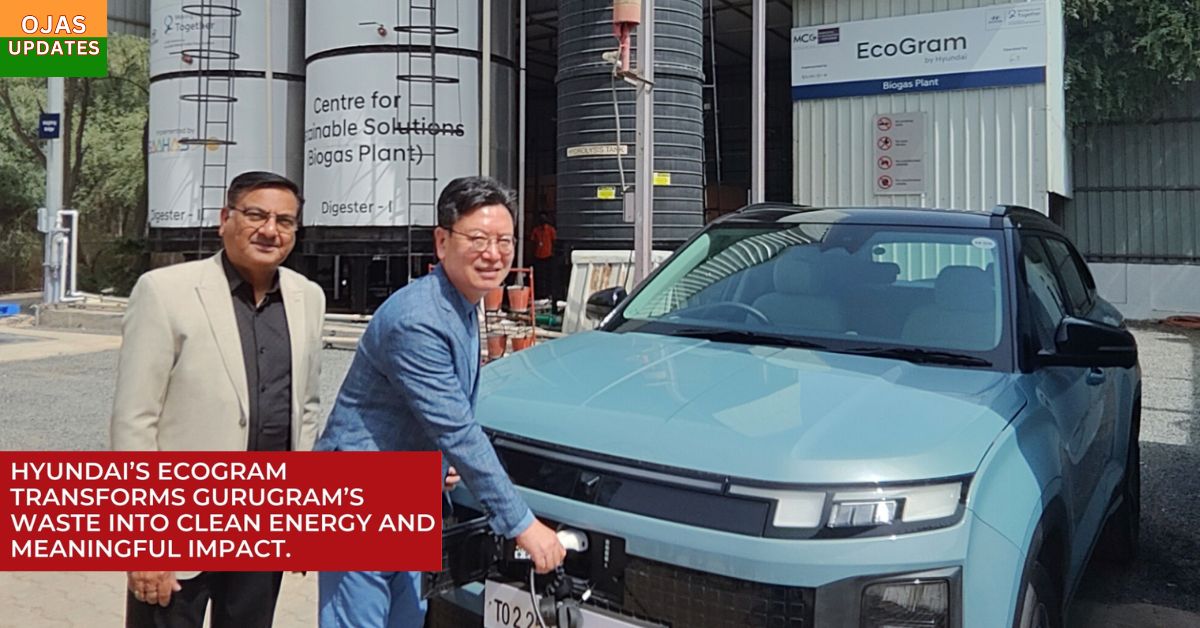In an era where sustainability is no longer optional but imperative, Hyundai Motor India has taken a bold step forward with its EcoGram initiative—a model biogas and material recovery facility located in Sector 53, Gurugram. Operational since October 2022, this facility is more than just a corporate social responsibility (CSR) project; it’s a living example of how urban waste can be transformed into clean energy and recycled resources, setting a precedent for cities across India.
🌱 EcoGram: A Vision Rooted in Sustainability
EcoGram is the brainchild of Hyundai Motor India Foundation (HMIF), developed in collaboration with the Municipal Corporation of Gurugram (MCG) and implemented by Bengaluru-based non-profit Saahas. The facility was designed to address the growing challenge of urban waste management by promoting circular economy practices and reducing landfill dependency.
Located near Paras Hospital in Gurugram’s bustling Sector 53, EcoGram is strategically positioned to serve the city’s commercial and residential zones. It collects wet and dry waste from 20 bulk generators, including residential welfare associations (RWAs), corporate offices, and commercial complexes, ensuring a steady stream of material for processing.
🔄 Waste to Energy: How the Biogas Plant Works
At the heart of EcoGram lies its biogas production system, which uses anaerobic digestion to convert food waste into methane gas. The facility houses two digester tanks with a capacity of 2 tonnes each, along with a hydrolysis tank that aids in breaking down organic matter. Enzymes and microorganisms work together to decompose the waste, producing methane that fuels a biogas-powered generator.
This generator produces up to 200 kilowatts of electricity daily, which is used to power the facility and its operations. The process not only diverts waste from landfills but also curbs greenhouse gas emissions—over 144,000 kg of CO₂ emissions have been avoided since the plant’s inception.
♻️ Material Recovery: Giving Waste a Second Life
EcoGram doesn’t stop at biogas. Its material recovery facility (MRF) is equally impressive. An all-women team manages the scientific segregation of dry waste, salvaging recyclable items such as paper cups, cardboard, and tin cans. These materials are compressed using bailing machines and sent to registered recyclers, ensuring that nothing goes to waste.
The facility processes up to 2,000 kg of wet waste and 5,000 kg of dry waste daily. Since its launch, it has recycled over 11,15,370 kg of waste, making a significant dent in Gurugram’s landfill burden.
🧠 Earth-Shala: Educating for Impact
Hyundai’s commitment to sustainability extends beyond infrastructure. The EcoGram site includes an open-air theatre called “Earth-Shala,” designed to host educational sessions, dialogues, and community engagement activities. Display boards and seating areas make it a welcoming space for visitors to learn about waste management and environmental stewardship.
So far, over 1,087 visitors—including school children, government officials, corporate delegates, and international guests—have toured the facility. These visits are instrumental in spreading awareness and inspiring similar initiatives across India.
👩🔬 Empowering Women and Communities
One of the standout features of EcoGram is its emphasis on women’s empowerment. The facility’s dry waste segregation team is composed entirely of women, providing them with stable employment, skill development, and a sense of purpose. This approach not only enhances operational efficiency but also fosters inclusive growth.
By involving local communities and creating job opportunities, Hyundai is demonstrating that sustainability and social impact can go hand in hand.
🌍 A Model for Urban India
EcoGram is more than a facility—it’s a replicable model for other urban centers grappling with waste management challenges. Its success lies in its integrated approach: combining biogas production, material recovery, community engagement, and education under one roof.
As cities across India face mounting pressure to manage waste sustainably, EcoGram offers a blueprint that is both scalable and impactful. It shows that with the right partnerships, technology, and vision, urban waste can be transformed into a resource rather than a liability.
🚀 Hyundai’s Green Commitment
Hyundai Motor India’s EcoGram initiative is part of its broader commitment to environmental responsibility. From electric vehicle development to green manufacturing practices, the company is aligning its operations with global sustainability goals.
Puneet Anand, AVP & Vertical Head – Corporate Affairs at Hyundai Motor India, and Jeongick Lee, Executive Director – Corporate Affairs, have both emphasized the importance of EcoGram in Hyundai’s CSR strategy. Their presence at the facility on World Earth Day 2025 underscored the company’s dedication to walking the eco talk.
🛤️ The Road Ahead
With EcoGram already making waves, the future looks promising. Plans for expansion, additional hydrolysis tanks, and enhanced community outreach are on the horizon. Hyundai’s initiative is a powerful reminder that sustainability isn’t just about technology—it’s about people, partnerships, and purpose.
As India moves toward a greener future, EcoGram stands as a shining example of what’s possible when innovation meets intention.

